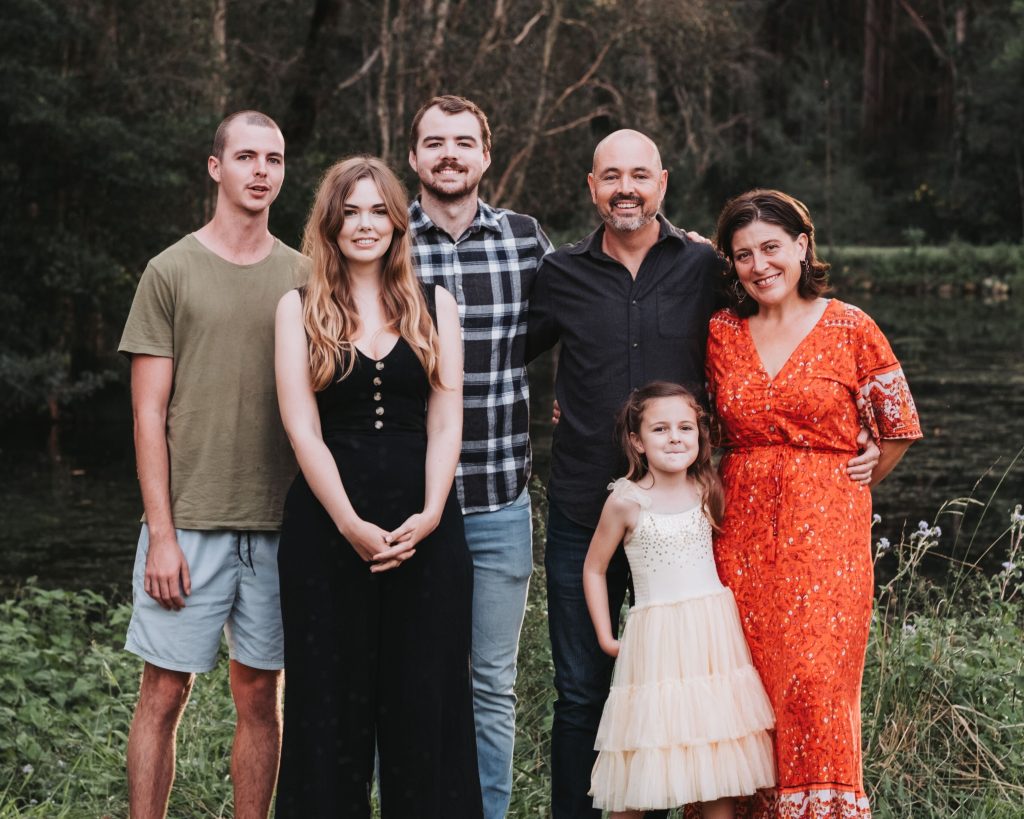
In the back of his Christian family’s station wagon, driving through Sydney as a teenager, Steve White looked out at the punks with their spiked hair and piercings outside Town Hall and thought, “Oh man, that looks like fun. They look like they are someone, they’ve got an identity.”
That moment captures the heart of what drove Steve’s teenage rebellion, and what he’ll be speaking about at PY Summer Camp 2025: the search for identity that defines so much of the teenage experience.
Now Senior Pastor at Young Presbyterian Church, Steve’s journey from prodigal son to pastor is one of profound transformation. Married to Deb with four children, Steve has found his place in the cherry-growing town of Young, four hours west of Sydney. It’s here, amidst sheep farms and orchards, that he ministers to a thriving community that includes about 40 teenagers who attend Impact Youth each Friday night, most of whom, as Steve puts it, “don’t know Jesus.”
A dramatic turnaround
Steve’s path to faith was anything but conventional. Growing up in a conservative Christian household, he rebelled against his Christian upbringing quite visibly from about the age of 13. By 17, he had moved to Sydney and was living what he describes as the life of “the prodigal son,” throwing himself into a lifestyle centred on music and pleasure.
“God in his mercy allowed my life to come crashing down pretty hard,” Steve reflects.
When he hit rock bottom, the only place he could go was to a cousin who was also a Christian and had experienced his own period of rebellion. After months of patient witness by his cousin, Steve found himself making what one might refer to as a ‘dangerous prayer’: “I’ve made a mess of my life. I’m handing it to you, God. You take over. You can do better than I can.”
What followed were a number of fairly turbulent years, but also a gradual understanding of God’s grace, mercy, plans, and Steve’s identity in him, which is why Steve is looking forward to speaking about identity at PY Summer Camp 2025.
Why identity matters
Steve’s personal experience of searching for identity in all the wrong places directly informs his passion for the topic he’ll be addressing at camp.
“If I had realised what my identity was in Jesus or was available to me in Jesus as a teenager, I would’ve let go of the idea that a radical life is a life apart from Christ and realise that the most radical life you could ever live is to live as a Christian,” he admits.
Steve’s talks will explore six key aspects of Christian identity, beginning with understanding ourselves as people made in the image of God, what he calls God’s “limited edition masterwork.” The following sessions will dig into what it means to be forgiven, to be citizens of heaven, to be adopted children of God, to be born into God’s family, and finally, to be “fishermen” called to spread the gospel.
“What we believe about ourselves shapes our actions fundamentally,” Steve explains. “The Bible already gives our identity. We don’t have to work that out, which is a really beautiful thing.”
The power of camp
Though this will be Steve’s first time attending PY Summer Camp, he’s witnessed firsthand the impact it has had on young people. Through teenagers in his congregation who have attended previous camps, he’s seen kids coming back enthusiastic, and sometimes having to take stock of life and rethink their priorities.
For country kids especially, who might be one of only two Christians in their entire school year, camp provides a revelation: “They go to this camp where there’s a whole bunch of other Christians and they realise this is something for teenagers, not just for our parents, not just for little kids, this is something for teenagers as well.”
Steve believes camps offer “a little taste of heaven”. It’s time away from normal pressures to be immersed in an environment where participants can spend days grappling with God’s Word alongside other believers, helping to solidify what they’re learning.
A revolutionary message
For teenagers struggling with identity questions, the Bible is both challenging and liberating. Rather than looking inward or defining themselves by their achievements and roles, the Bible shows them that we actually find our identity by looking without. Steve will help campers to look at the Maker and at his manual as to how he’s created us and how we are meant to do life.
“We go to different places to try to work out where our identity is,” Steve observes, “and those places aren’t good places to go to. They can’t bear up under the weight of the tasks that we give them.”
His conviction is audacious: “If teens can get along to this [camp], and they can grapple with this, and they can allow this to be absorbed into their thinking… it will revolutionise their entire future, and I don’t think that’s too bold a statement. I think it’s actually the truth.”
For Steve, who knows firsthand the pain of seeking identity in temporary things, this camp represents an opportunity to spare teenagers from the mistakes he made. As someone who understands what it means to be forgiven much, he loves much, and he’s eager to share the life-changing truth of who we really are in Christ.
The search for identity that once drove a teenage Steve to seek meaning in rebellion can now drive teenagers toward the most radical life imaginable: one rooted in the unshakeable truth of God’s love and purpose.
